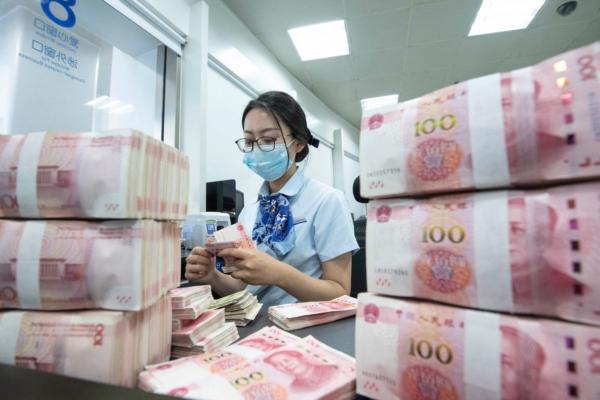Over the past 20 years, the central bank has avoided buying such bonds in the secondary market, except in 2007 when China’s stock market tumbled.
China’s central bank, the People’s Bank of China (PBOC), said that it purchased 400 billion yuan ($56.3 billion) in special government bonds from primary dealers, a move that economists say reflects the challenges faced by the communist regime, as investors and banks view these bonds as a safer option in a declining economy.
The PBOC said that it purchased the special government bonds from primary dealers in the open market operations on Aug. 29, including 300 billion yuan ($42.3billion) worth of 10-year term bonds, and 100 billion yuan ($14.1billion) worth of 15-year term bonds, according to an announcement published on its website.
The PBOC also added a new section, “Open Market Treasury Bond Trading Business Announcement,” to its open market operations page on its official website last week, indicating that its purchase of government bonds may become common going forward.
According to China’s bank laws, the central bank is not allowed to directly buy treasury bonds in the primary market. The legislation does not ban it from buying and selling treasury bonds in the open market through primary dealers or in the secondary market.
“The primary dealers are some state-owned banks, securities companies, and trust funds that directly interface with the central bank,” Davy J. Wong, a Chinese American economist, told The Epoch Times.
Sun Kuo-hsiang, a professor of international affairs and business at Nanhua University in Taiwan, told The Epoch Times, “Transactions in the primary market involve financial instruments, such as stocks and bonds, issued for the first time, and funds flow directly into the hands of the issuer.”
Sun added, “Primary dealers have a special position in the market and can directly participate in the primary market issuance of government bonds and conduct policy transactions with the central bank, through which the central bank can effectively affect market interest rates and liquidity.”
Over the past 20 years, the PBOC has avoided buying such bonds in the secondary market, except in 2007 when China’s stock market tumbled. Then, the central bank bought 1.35 trillion yuan ($190.3 billion) in special government bonds in the secondary market.
Sun said, “Transactions in the secondary market do not involve the flow of funds into the issuer, but are instead circulated and traded among investors.”
Wong explained that the “secondary market is generally equivalent to the general private market, where ordinary people can buy and sell bonds. This is also a difference between primary and secondary markets.”
Sun pointed out that such a large-scale bond purchase by the PBOC highlights severe challenges for China’s economy.
“First, weak economic growth and weakening investment demand have forced the central bank to adopt more aggressive monetary policies. Second, investors seek assets, leading to a sharp decline in long-term bond yields, showing a lack of market confidence. Third, central and local government debt levels are high and the space for fiscal policy is limited, forcing the central bank to support the economy through monetary policy.”
Sun said the central bank’s purchase of huge treasury bonds “can alleviate the liquidity pressure in the market. But the negative impact is that investors will think that the central bank relies too much on ‘printing money’ to solve economic problems, and will worry about future inflation risks and currency depreciation.”
He warned that this will “weaken their confidence in RMB assets and lead to capital outflows and market instability.”
Printing Money, Rolling Over Debt
Wong said that the PBOC’s purchase of 400 billion yuan of bonds is in preparation to roll over the government bonds, as “it buys back the soon-to-maturity government bonds from these primary dealers and commercial banks, and gives the funds to these commercial banks.”
The Ministry of Finance will then “issue an equal amount of bonds. After these commercial banks receive 400 billion from the central bank, they will buy the new bonds from the Ministry of Finance,” he said.
Meanwhile, CCP’s official media has denied that the PBOC’s purchase is quantitative easing or the monetization of China’s fiscal deficit. Quantitative easing is a form of monetary policy in which a central bank purchases securities in the open market to reduce interest rates and increase the money supply, which may trigger higher inflation.

A bank employee counts 100-yuan notes at a bank counter in Nantong, in China’s eastern Jiangsu Province, on June 13, 2023. STR/AFP via Getty Images
Sun said that the central bank’s purchase of government bonds can be regarded as “money printing because it purchases assets by increasing the money supply, but this is part of monetary policy.”
“When bonds are issued, it is equivalent to printing money because all its bonds are bought back by the central bank and commercial banks,” Sun said.
Wong shares a similar assessment, “It’s completely a rolling debt operation. This situation only exists in communist China, that is, it has to issue continuous treasury bonds to buy back the old debt and then issue new debt.”
“The greater the total amount of treasury bonds issued by the Ministry of Finance, the worse the economic situation and the government’s fiscal situation,” Wong added.
Henry Wu, an economist in Taiwan, said, “The Ministry of Finance, which decides on the issuance of government bonds, and the Central Bank, which prints money, are both under the control of the Communist Party. This leads to the situation that no matter the value of government bonds the Ministry of Finance wants to issue, the central bank has to foot the bill for it. The result is unlimited money printing without value, which is an almost inevitable phenomenon at the end of a dynasty.”
Luo Ya contributed to this report.
Source link






































Add comment